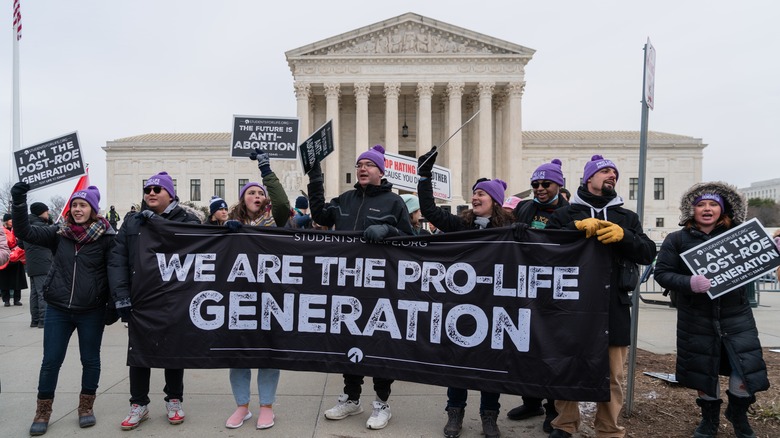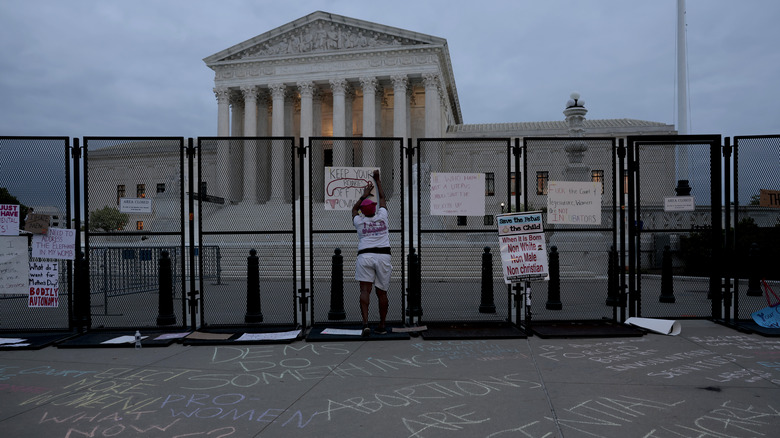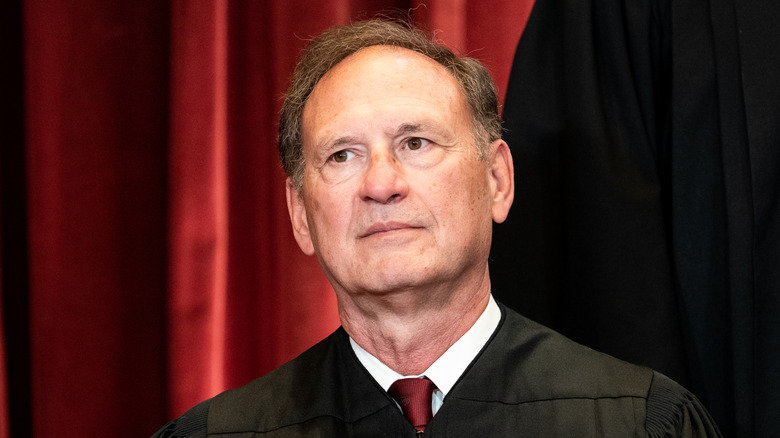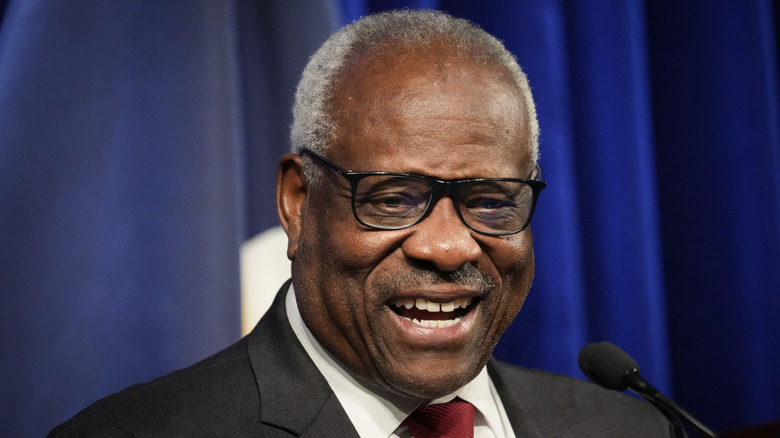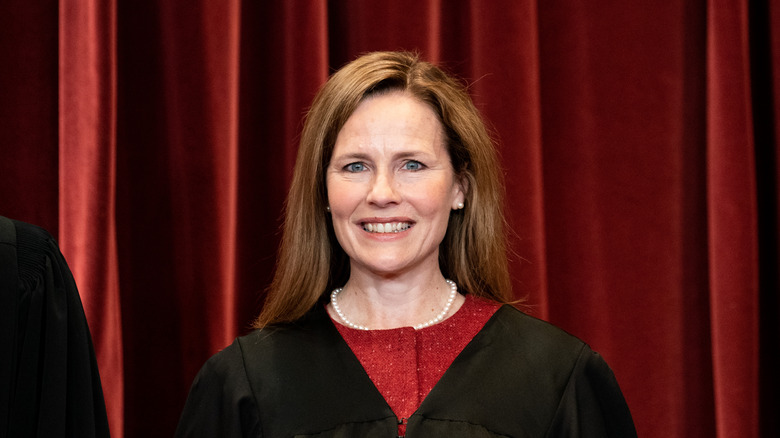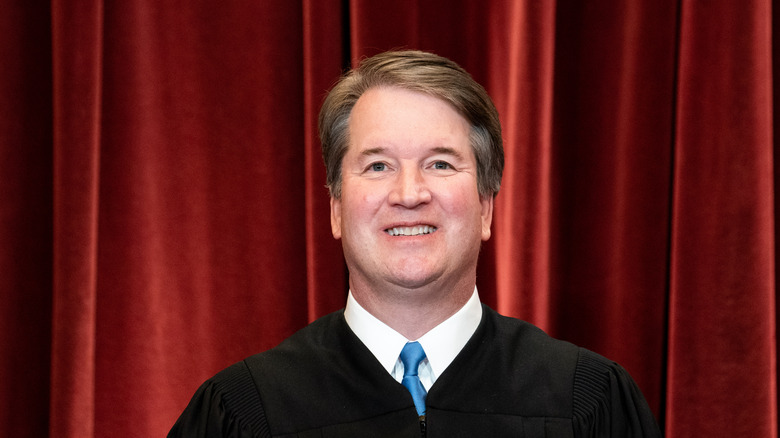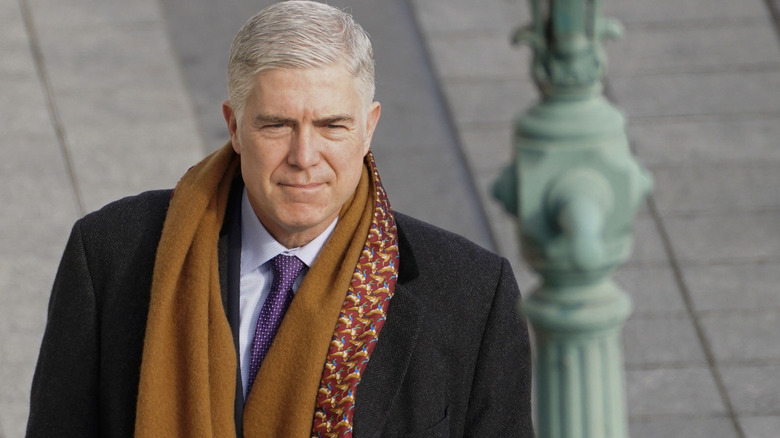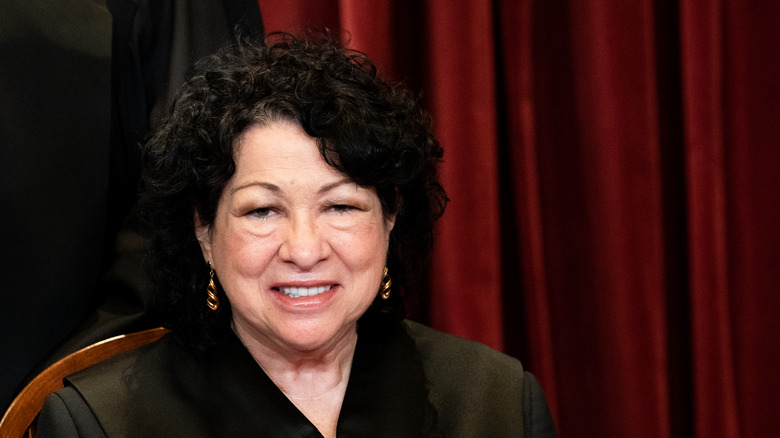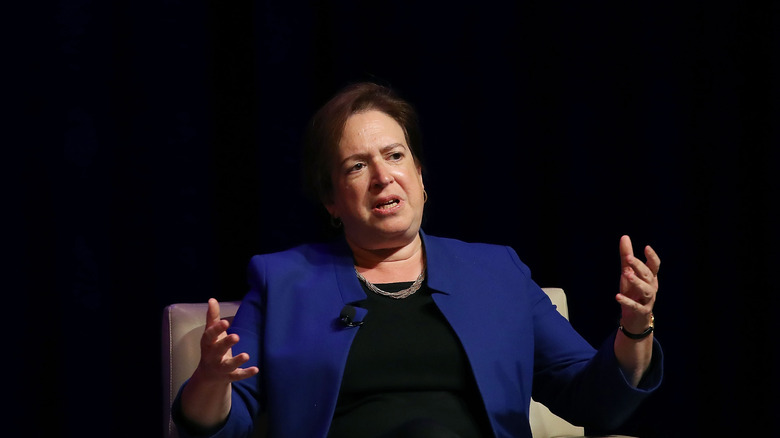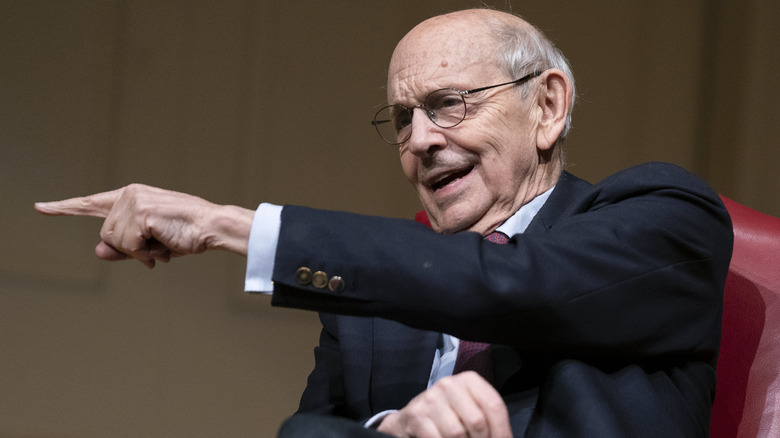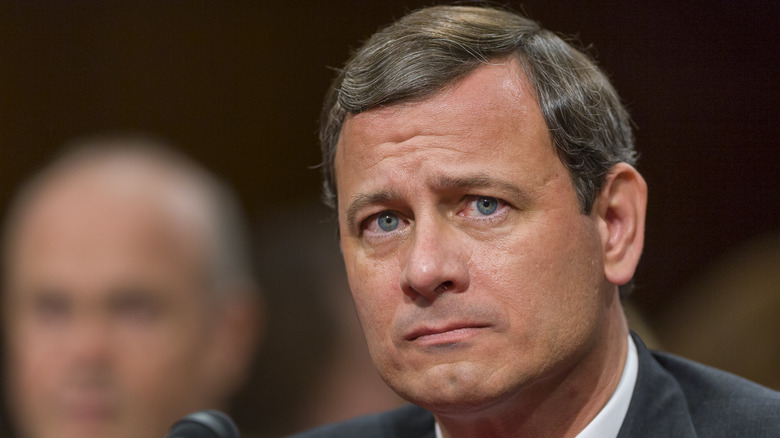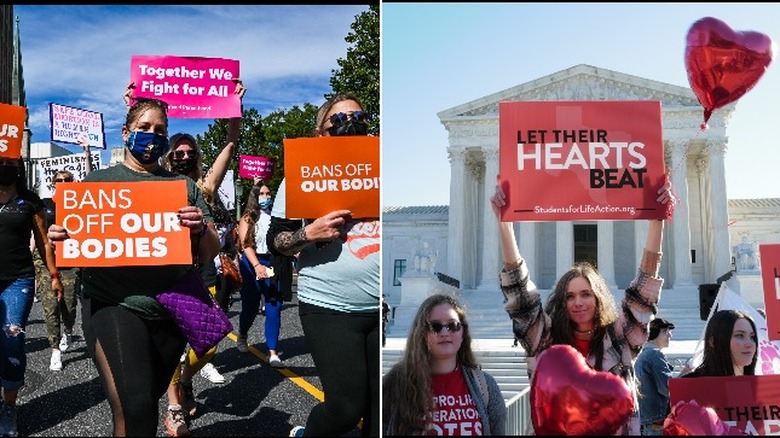Here Is What The Supreme Court Justices Have Said About Roe V. Wade
On May 2, 2022, Politico reported that someone had leaked a draft of Justice Samuel Alito's opinion of the Dobbs v. Jackson case regarding a Mississippi law that banned abortion after 15 weeks. In the opinion, Alito wrote that the court's majority had effectively voted to overturn Roe v. Wade, the 1973 decision that legalized abortion as a constitutional right. The leak caused an uproar, particularly among the justices themselves, who implied that it was an attempt to sway the vote before the ruling was handed down.
Chief Justice John Roberts issued a statement saying that the leak and subsequent public pressure will not affect the court's operation or decision. Now, eight of nine justices have very strong thoughts about Roe v. Wade that have informed their opinions on the case. They generally are split between Roe's supporters and opponents. The justices' have often indirectly criticized or supported Roe to avoid accusations of bias. But challenges have increased, and so has the outspokenness of their opinions. Here are the justices' past pronouncements and their relation to the current case.
The background of Roe
Roe v. Wade centered around whether state restrictions on abortion were constitutional. According to the case itself, the Supreme Court ruled in favor of the plaintiff, opining in the majority opinion that Texas -– and any other state that made abortion illegal for that matter -– violated the 14th Amendment right to equal protection and due process.
The decision effectively enshrined abortion as a constitutional right within certain parameters rather than on-demand. Women could now elect to have an abortion in the first trimester without government intervention, or in the second, but subject to restrictions "reasonably related to maternal health." States were free to restrict the procedure beyond that point once the child was considered "viable."
However, Roe v. Wade was a controversial case even from a legal standpoint. Dissenting justice William Rehnquist wrote that abortion was nowhere rooted in the constitution nor did the framers of the 14th Amendment intend for there to be a right to one, given that abortion had (technically) been illegal in the United States until 1967, when according to CNA, Colorado became the first state to legalize it. Thus, opponents have claimed Roe rested on shaky ground, which has given pro-life activists a chance to overturn Roe with Dobbs v. Jackson. Should the split in Justice Samuel Alito's leaked draft opinion hold, it effectively spells the end of Roe v. Wade.
Samuel Alito
Samuel Alito is known for taking a hard line against Roe. In a 1985 memo cited in his confirmation hearing (via Politico), he wrote as a lawyer at the Reagan DOJ that Roe v. Wade was incorrectly adjudicated. In his 2005 confirmation hearing, he noted that Roe was precedent, but not "settled law," since the Supreme Court cannot pass laws but merely interpret them.
Alito's leaked draft opinion on Dobbs v. Jackson lambasted Roe v. Wade, calling it an incorrect presentation of legal history at worst and constitutionally irrelevant at best. Alito summarized Roe as a classic example of judicial overreach, noting that before 1973, no one had ever challenged the right of states to regulate or ban abortion. However, Roe v. Wade imposed a "highly restrictive regime" on all states -– even socially conservative ones where there was little support for the practice.
Alito's opinion made appeals to federalism. He claimed nothing in the Constitution suggested that the right to abortion was rooted in American history or tradition. Thus, he feels Roe v. Wade constituted an attempt by the court to legislate from the bench, a criticism that according to Fox, Alito shared with numerous ideological rivals such as Ruth Bader-Ginsburg. This is his basis for believing the Roe precedent has no constitutional basis and should be overturned.
Clarence Thomas
At his 1991 confirmation hearing (via C-SPAN), Clarence Thomas refused to answer questions about his position on Roe v. Wade, noting that giving his opinion would call his impartiality into doubt. Since his confirmation, Thomas has criticized Roe v. Wade dating back to his first term on the court in 1992. In Planned Parenthood v. Casey, the court ruled that a Pennsylvania law requiring doctors to counsel abortion patients and women to inform the fathers of their children was considered an "undue burden" and unconstitutional. It also placed the 24-week limit on unrestricted abortion. Thomas dissented from the majority, siding with William Rehnquist and Antonin Scalia in upholding the Pennsylvania provisions as constitutional because they were regulations on abortion rather than prohibitions.
Thomas' strongest dissent came in Stenberg v. Carhart when SCOTUS struck down Nebraska's partial-birth abortion ban in 2000. Thomas's dissent issued a full broadside against Roe v. Wade. Thomas argued first that nowhere in the Constitution was there an enshrined right to abortion, noting that the people of each sovereign state had the right to decide whether the practice should be legal. Roe v. Wade was the "unrestrained imposition of [the Court's] own, extraconstitutional value preferences" in reading a right to abortion in the 14th Amendment.
The leaked draft opinion has Thomas concurring with Samuel Alito's majority opinion to strike the case down. Given his past statements, he probably won't be changing his vote, even in the face of public pressure.
Amy Coney Barrett
Amy Coney Barrett is by far the most vociferous opponent of abortion on the court. However, most of her comments on Roe v. Wade have come in a private capacity. According to a tweet from Lifenews, Barrett signed a newspaper ad calling for Roe to be overturned, citing the case's "barbaric legacy" and the deaths of "47 million aborted children."
According to a Today report, Catholicism defines Barrett's private life. However, as The Guardian notes, she is part of a Catholic group with a "highly authoritarian" structure. She has seven children, including two adopted children and a third with Down Syndrome. As the Atlantic notes, the syndrome is often a reason for abortions, so Barrett's child evidences her strong pro-life views.
At her confirmation hearing, Barrett refused to answer questions about her personal views on Roe v. Wade's validity, noting that it would call her impartiality into question. But she assured the committee that her personal opinions would not influence her judgments. Barrett has two important rulings on abortion so far. First, in Whole Woman's Health v. Jackson (via NPR), Barrett voted with the majority to uphold the Texas heartbeat bill S.B. 8 pending state-level challenges. In the oral arguments for Dobbs v. Jackson (via Politico), she completely rejected Roe's reasoning. Challenging unwanted children as undue burdens, Barrett argued that no-questions-asked adoption centers negated the reasoning that a child was an undue burden if it could be given up. Thus, her vote in Dobbs v. Jackson is unsurprising.
Brett Kavanaugh
Brett Kavanaugh, like many of the other justices, is Catholic. According to CNA, he articulated during his confirmation hearings that he believed that Roe v. Wade was settled precedent (not law) when asked about his views on the case. He also, however, noted that states should have the right to place strict restrictions on the practice. He refused to answer any questions about his personal views, knowing that any answer would call his impartiality into question, noting only that he would abide by his duties as a judge.
In his judicial decisions, Kavanaugh's SCOTUS votes suggest some degree of opposition to Roe. In 2019, per Politico, Kavanaugh opposed granting a 17-year-old girl in federal immigration custody an abortion. However, this denial was more likely grounded in barring illegal immigrants from constitutional protections because of implications for immigration enforcement. However, he voted to uphold Texas' S.B. 8 (abortion ban when a heartbeat is detectable) in Whole Woman's Health v. Jackson, although he agreed that activists had the right to challenge it.
Kavanaugh, per Politico, has voted to overturn Roe v. Wade by upholding Mississippi's 15-week limit on abortions in the case Dobbs v. Jackson. His vote should not be much of a surprise given his record, but as noted in Politico, conservatives were worried that Kavanaugh would be too compromising on Roe, so one must await the final opinion. Should he not issue a concurring opinion, it can be assumed that he rejects the constitutionality of Roe v. Wade as Alito opined.
Neil Gorsuch
Neil Gorsuch is well known for his adherence to an originalist reading of the Constitution. According to Ballotpedia, he has generally favored states rights over federal power. During his confirmation hearings, he was asked like all other nominees, about Roe v. Wade. Gorsuch answered that it was reaffirmed precedent worthy of treatment as such, but did not openly rule out overturning the case. He also refused to call Roe a "super precedent" that should not be overturned but claimed that he would have "walked out the door" had President Donald Trump asked him to overturn it.
For Roe v. Wade, Gorsuch's rulings provide a look at his likely choice to overturn Roe. In 2013, while a judge on the 10th Circuit, Gorsuch ruled with the majority in Hobby Lobby v. Sebelius, that religious liberty protected private corporations and employers' right to refuse access to contraception and abortion in health insurance based on "sincerely held religious beliefs." He also dissented from the June Medical Services v. Russo ruling in which Louisiana's provisions that abortion providers have admittance privileges, which put a Louisiana provision that abortion providers had to have admitting privileges at nearby hospitals on hold. Gorsuch argued that since the Louisiana law was in the interest of protecting women from potentially fatal side effects of abortion, it should be maintained as necessary in keeping with Planned Parenthood v. Casey.
Sonia Sotomayor
Sonia Sotomayor is one of the three liberal justices that has voted to keep Roe v. Wade and its subsequent affirmations. In her confirmation hearings, per NPR, she called the case "settled law," but like all the other justices, refused to provide her personal opinions on questions such as the starting point of human life or the constitutionality of Roe v. Wade.
Sotomayor has ruled variously on the abortion issue to the point that according to NIFLA, some hoped she would be the fifth justice needed to reverse the case. After all, she voted to uphold the Mexico City policy that allowed the federal government to deny funding to organizations that promoted abortion abroad. But her more recent opinions show clearly that she supports the constitutionality of Roe here in the United States.
In her dissent to Whole Woman's Health v. Jackson, which allowed Texas' S.B 8 to stand pending legal challenges, Sotomayor argued that Texas' ban on abortions after six weeks was "stunning" for "[nullified] federal constitutional rights." Her greatest concern was that the law had circumvented judicial review because the state was not technically enforcing the law –- private citizens with financial incentives were, essentially placing bounties on women's personal medical decisions. In Dobbs v. Jackson, per NBC, however, Sotomayor could only appeal to precedent, arguing that overturning the case would cost the court its legitimacy. She will undoubtedly file a dissent should the current 5-3 vote stand that will better outline her opposition.
Elena Kagan
According to Politico, Elena Kagan was accused of being too politically biased towards abortion due to her work with the Clinton Administration, in which her support for a woman's right to choose was "written in black and white." However, her defense of Roe under Clinton should be seen in the same vein in which Alito opposed it under Reagan. In her confirmation (via CNN), she assured the committee that she would separate her personal views from the political views she advocated as a Clinton lawyer.
Kagan has been open to compromise in the past. According to one memo, when President Bill Clinton vetoed the partial-birth abortion ban, she urged the president to support an amendment that would ban most partial-birth abortions while still preserving some exceptions as a compromise lest Congress override the president. Her SCOTUS record is in line with her previous actions.
Kagan's opinions on Roe are best reflected in her recent dissent in the Whole Woman's Health v. Jackson. Kagan joined Chief Justice John Roberts on the dissent and during the oral arguments, arguing that Texas' heartbeat bill S.B. 8 ran counter to previous SCOTUS rulings such as Roe v. Wade and circumvented the constitutional protections of abortion as determined in Roe. Thus, according to The 19th, Kagan called the law "patently unconstitutional," putting her firmly in the pro-Roe v. Wade camp.
Stephen Breyer
According to OntheIssues, Breyer is a pro-choice justice that called Roe v. Wade "settled law" in 1988. While serving on SCOTUS he has upheld a woman's right to choose in the vast majority of cases. In a CBS interview, it was noted that Breyer rejects constitutional originalism. Thus, his position supposes that the Constitution must be reinterpreted to accommodate societal change. Abortion is one of these issues, since women are considered full citizens now as opposed to when the Founders wrote it.
Breyer's view on Roe v. Wade is well reflected in the 2000 Stenberg v. Carhart case over Nebraska's partial-birth abortion law. In the majority opinion, Breyer wrote that the law was unconstitutional because it imposed an undue burden on women by restricting their choices in what kind of abortion could be performed in consultation with a medical provider, showcasing the justice's pro-choice credentials.
Most recently, Breyer has discussed the Whole Woman's Health v. Jackson case, in which he dissented from the majority opinion. In an interview with NPR, he called the court's decision "very, very, very, wrong" because it allowed the law to be enforced by private citizens rather than the state. In the same interview, however, he argued against changing SCOTUS' structure and called on pro-choice activists to be careful in their calls lest it lead to politicization and violence. The draft indicates he is in the dissent of the Dobbs v. Jackson case.
John Roberts
Chief Justice John Roberts would be expected to be pro-life. According to the LA Times, Roberts is Catholic and his wife Jane is a well-known pro-life activist. But at his confirmation hearing, he defended the use of judicial precedent in cases such as Roe v. Wade and Planned Parenthood v. Casey but refused to state his personal opinion on Roe v. Wade lest it compromise his impartiality. But he did testify that overturning the case would be a "jolt" to the legal system that would have to be carefully approached. Finally, he also defended the right to privacy as enshrined in the Constitution.
In the same vein as his confirmation testimony, Robert's rulings suggest that he is not anti-Roe as some of his colleagues are. Roberts most notably dissented from the conservative majority in the Whole Woman's Health v. Jackson case, arguing in the dissent that he agreed that the Texas law circumvented judicial review through its use of private enforcement and "effectively chill[ed]" the provision of abortion in the state.
According to Politico, Roberts has not yet voted on the Dobbs v. Jackson case. However, his vote will not change the outcome unless one of the conservative judges flips too, making the total –- should he side with the liberals -– 5-4.
What changes?
So what will happen if Roe v. Wade is overturned? According to Fox, it will not make abortion illegal. Instead, it will, as Alito noted in the leaked opinion, kick the issue back to the states. In practice, per NBC, 23 states will revert to pre-1973 abortion bans or pass "trigger laws" that are to take effect as soon as Roe is overturned. Michigan, for instance, per the Detroit Free Press, won't defend its 1931 abortion ban in court, while states such as Texas and Louisiana will no doubt criminalize abortion and enforce it, potentially putting women in prison even just for miscarrying, something that is already being threatened. States such as Florida have tried to give the image of compromise with 15th-week bans (via NPR).
In states with legal abortion, little will change. As The City notes, places such as New York already codified Roe back in 2019. Places such as New York could, however, become "abortion safe havens" for patients from states without legal abortion. Abortion opponents in blue states could oppose this, because as The City notes, these havens will be taxpayer-funded. According to Catholic America Magazine, 54% of Americans oppose any sort of public funding for abortion. However, a Pew Research poll showed that 59% of Americans think abortion should be legal. The only thing that is certain is the abortion debate – which leaves little space for compromise – is going to split the country further heading into the November 2022 midterms, where it will likely be a key campaign issue on both sides.
